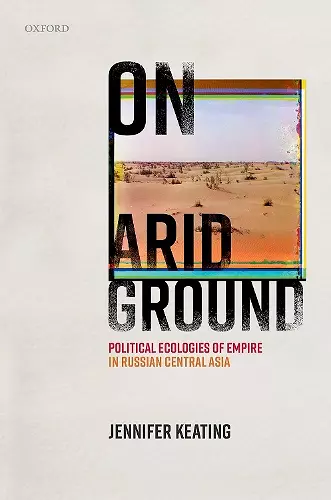On Arid Ground
Political Ecologies of Empire in Russian Central Asia
Format:Hardback
Publisher:Oxford University Press
Published:14th Apr '22
Currently unavailable, and unfortunately no date known when it will be back

2023 Royal Historical Society Gladstone Book Prize Winner
On Arid Ground focuses on the relationships between empire and environment in Central Asia, using environmental history to examine the practice of Russian imperialism in Turkestan at the end of empire, from the 1860s until 1916.On Arid Ground focuses on the relationships between empire and environment in Central Asia, using environmental history to examine the practice of Russian imperialism in Turkestan at the end of empire, from the 1860s until 1916. It reveals for the first time a comprehensive assessment of the environmental imprint of Russian colonisation, and shows how local ecologies fitted into broader repertoires of imperial rule, accommodation, and resistance. Ranging widely above and below the surface in Turkestan, from the deserts of Transcaspia to the highlands and lowlands of rural Fergana and Semirech'e, Jennifer Keating explores infrastructure development, migrant settlement, land reclamation and dispossession, the commodification of nature, and environmental violence to reveal the ways in which ecological change was central to the building and breaking of empire. Attentive to connections, synchronicities and scale, On Arid Ground makes the case for looking beyond cotton and water in Central Asian context, for the powerful material role played by animals and plants, sand, silt, and salt in human histories, and for the less visible relationships between far-flung people and things within and beyond Turkestan's borders. Laying bare the political roots and repercussions of environmental change, the volume brings fresh perspectives both to the history of Central Asia and to that of the wider Russian empire across Eurasia.
Jennifer Keating's On Arid Ground s a path-breaking study of the way empire and environment interacted in Central Asia through the 19th and early 20th centuries. This book innovates on a number of fronts, not least by showing the importance of ecology and environment in forcing the Russian Empire to adapt its long-term geopolitical strategy. It significantly changes the way we think of Russian Empire-building and outlines a fascinating picture of land reclamation, settlement and commodity development, while often putting to the fore actors beyond the human, from sandstorms to termites. Inspiring and important, it will be influential for historians working on other imperial contexts, and above all for our thinking about environment and human social and political organisation today. * 2023 Gladstone Book Prize Judges' Citation *
In this excellent work, Jennifer Keating shows that paying close attention to seemingly little things like sand, saxaul, termites, and apples, in addition to more traditional big topics like cotton and irrigation, is crucial to our understanding of the Russian Empire in Turkestan...Keating's book draws heavily on archives in St. Petersburg, Moscow, and Almaty. It also engages deeply with the historiography of Russian Central Asia and places it in the context of new global histories of empire and the environment. This makes it a welcome addition to several fields, and of interest to historians not only of Russia or Central Asia but also of imperialism and the environment. * John B. Seitz, Russian Review *
Excellent book * Sarah Cameron, Slavonic and East European Review *
- Winner of Winner, 2023 Royal Historical Society Gladstone Book Prize Honourable Mention, Alexander Nove Prize, British Association for Slavonic and East European Studies.
ISBN: 9780192855251
Dimensions: 240mm x 164mm x 23mm
Weight: 612g
268 pages